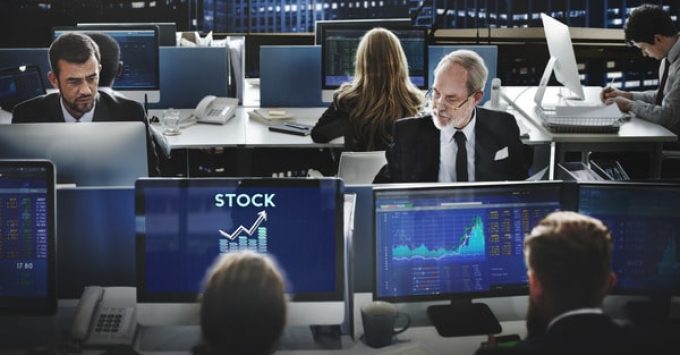A trading desk refers to a specialized area within a financial institution such as a bank where trading activities are performed. Its primary function is to execute buy and sell orders for various financial instruments on behalf of the bank’s clients or the institution itself. These financial instruments include stocks, bonds, currencies, commodities, derivatives, and other securities. Moreover, the trading desk is a crucial component of an institution’s capital markets or securities trading operations.
Firstly, let’s go through the key features of the financials of these desks
Key Features of Trading Desks
Here are some key features of a trading desk.
- Traders: The individuals working on a trading desk are known as traders. Traders are responsible for analyzing market conditions, making trading decisions, and executing trades. They also specialize in a particular asset class or trading strategy.
- Risk Management: Risk management is a critical function of a trading desk. Traders and risk managers work together to monitor and manage the risks associated with trading activities, including market, credit, and operational risks.
- Technology and Infrastructure: Trading desks rely heavily on advanced technology and infrastructure for real-time market data, order execution, and risk management. High-frequency trading (HFT) strategies, algorithmic trading, and electronic trading platforms are common in modern trading environments.
- Client Services: In addition to proprietary trading, some trading desks also handle client orders. Institutional clients such as asset managers or corporations may place orders with the bank’s trading desk to execute trades on their behalf.
Overall, a trading desk plays a pivotal role in financial operations. It contributes to generating revenue through trading activities while managing associated risks. The specific structure and functions of a trading desk can vary depending on the type of financial institution and its business model.
Now, let’s briefly understand the types of trading desks.
Types of Trading Desks
Trading desks are often organized based on asset classes. For example, there may be separate desks for equities, fixed income, foreign exchange (Forex), commodities, and derivatives. Each desk specializes in trading specific types of financial instruments.
Here are some common types of trading desks:
- Equity Trading Desk: The equity desk deals with buying and selling stocks (equities). Traders on this desk focus on equity markets. They analyze company performance and market trends to make trading decisions.
- Fixed-Income Trading Desk: Fixed-Income desk handles bonds and other fixed-income securities. Traders here work with government and corporate bonds. They adjust their strategies based on interest rates and economic conditions.
- Foreign Exchange (Forex) Trading Desk: The Foreign Exchange (Forex) trading desk specializes in trading currencies from different countries. Forex traders keep an eye on global economic factors to predict currency value changes and make profitable trades.
- Commodities Trading Desk: The commodities trading desk focuses on buying and selling physical goods like gold, oil, agricultural products, etc. Traders on this desk monitor supply and demand factors, geopolitical events, and global economic conditions that affect commodity prices.
- Derivatives Trading Desk: The derivatives desk specializes in financial instruments derived from underlying assets like options and futures. In this scenario, traders deal with contracts whose value is based on the price movements of other financial instruments using complex strategies to manage risk and maximize returns.
- Market-Making Desk: The Market-making desk engages in market-making activities by quoting bid and ask prices. It provides liquidity to the market and aims to profit from the bid-ask spread.
HOW TO BUYT ETHEREUM ON ETORO

Each type of trading desk requires specific knowledge and skills. Traders on these desks often collaborate to cover a broader range of financial instruments and market activities.

Compliance & Regulations of a Trading Desk
A Trading desk operates within a regulatory framework and compliance with financial regulations is a priority. Compliance officers work closely with traders to ensure all activities adhere to applicable laws and regulations.
These desks have important procedures to follow to make sure they know who their clients are. They must verify the identity of each client to prevent illegal activities like money laundering. In addition, they also implement programs to monitor client transactions for suspicious patterns that could indicate money laundering. They report any suspicious activities found to regulatory authorities.
An investment desk also has controls to follow regulations against insider trading and market manipulation. They cannot use private information to trade for their clients. A desk is required to get the best price for client orders. They need policies to make sure orders are filled quickly at the best available price.
All desks keep detailed records of all trades and communications. Regulators can audit these records. These desks also manage risks of the market, clients, and their operations. They have rules to limit potential losses.
Role of Technology in Trading Desks
Technology is the backbone of modern trading desks. Here are some key aspects:
Algorithmic Trading:
- Automated Trading Strategies: These desks use algorithms to automate buying and selling decisions based on predefined criteria.
- Role of Algorithms: Algorithms analyze market data in real-time. They execute trades at optimal moments and contribute to faster and more precise decision-making.
Artificial Intelligence in Trading:
- Data Analysis and Prediction: AI is employed for in-depth data analysis, identifying patterns and trends that human traders might miss.
- AI Applications: Examples include machine learning models predicting market movements, sentiment analysis of news for informed decisions, and risk management tools.
High-Frequency Trading (HFT):
- Rapid Trading Strategies: HFT involves executing a large number of orders at extremely high speeds. They take advantage of small price discrepancies.
- Technology Requirements: HFT relies on cutting-edge technology including powerful computers, low-latency networks, and specialized algorithms for swift order execution.
Final Words
Trading desks play a vital role in financial markets. They facilitate efficient trading with advanced technology and setups. Future trends like blockchain and cryptocurrency integration highlight ongoing changes.

